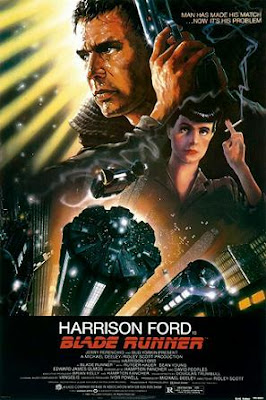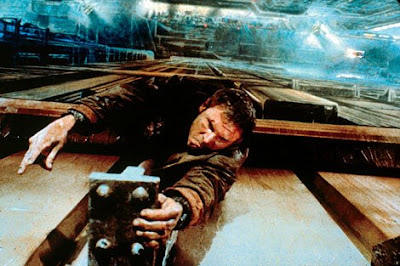



I don’t think I’ve watched Ridley Scott’s masterpiece, Blade Runner, as many times as I have watched the other old movies I’ve mentioned so far. Regardless, the lasting impression this film had on me is undeniably remarkable. The last time I saw it was in 2000 at university for “Film Theory and Critique”. I wanted to do a project on it, but after seeing it again since my childhood I just couldn’t get enough distance to write objectively about it. It is nine years later now. Watching it again just now had me captivated. As scene for scene rolled by, it felt to me intensely personal – as if these surreal images were my memories. Of course, they are memories, but not my memories. But then again, could my little mind recognise the difference? The movie dates 1982; I was still a toddler when it came out. I can’t remember when I saw it for the first time, but it couldn’t have been too long after its release date, and a number of times throughout my early years thereafter. And so the cinematic images became part of my childhood, part of me, like the fake memories implanted into the androids depicted in the movie. Reflecting on my childhood memories, the dystopian cityscape with its air pollution and gas burners, the flying cars and overcrowded streets in those bizarre Oriental-markets seems as real, or as distant, as some of my supposedly real memories from childhood. And here I am in the Orient now. There are no flying cars, but on a rainy evening in one of Seoul’s downtown markets with its dreamy juxtaposition of bright lights and side-street butcher-restaurants it is difficult to distinguish between sci-fi and reality.
As was the case in 2000, still I cannot write objectively about Blade Runner. Nevertheless, it is a classic movie; a trendsetter that impacted many a sci-fi film to come; a deeply emotional rendition of the android/cyborg-dilemma, without getting sentimental.
Blade Runner is based on Philip K. Dick’s novel Do Androids Dream of Electric Sheep? Directed by Ridley Scott and starring Harrison Ford, Rutger Hauer, Sean Young, and Daryl Hannah. Jordan Cronenweth was responsible for the excellent cinematography.
Watch the trailer below:
Below is the “I’ve seen things”-scene. If watched out of context it will probably not be as beautiful as it is within the flow of the movie where it captures a host of conflicting emotions as one exquisite moment. Don’t watch it if you haven’t seen the movie as it might be a spoiler.
